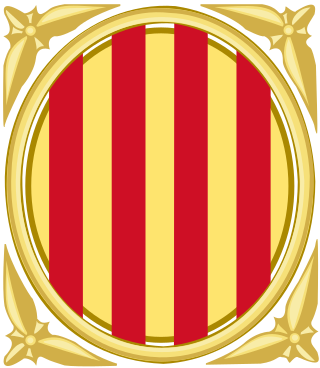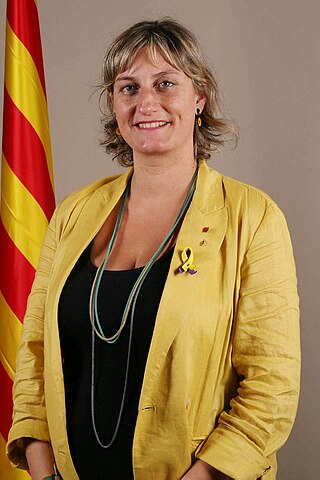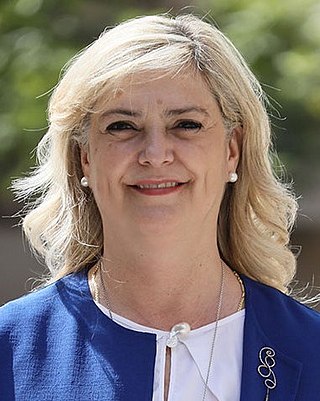The Generalitat de Catalunya, or the Government of Catalonia, is the institutional system by which Catalonia is self-governed as an autonomous community of Spain. It is made up of the Parliament of Catalonia, the President of the Government of Catalonia, and the Executive Council of Catalonia. Its current powers are set out in the Statute of Autonomy of Catalonia of 2006.

Josep Bargalló i Valls is a Spanish teacher and politician from Catalonia and the current Minister of Education of Catalonia.

The government of Pasqual Maragall was formed on 22 December 2003 following the latter's election as President of the Government of Catalonia by the Parliament of Catalonia on 16 December and his swearing-in on 18 December, as a result of the Socialists' Party of Catalonia (PSC), Republican Left of Catalonia (ERC) and Initiative for Catalonia Greens–United and Alternative Left (ICV–EUiA) being able to muster a majority of seats in the Parliament following the 2003 Catalan regional election. It succeeded the sixth Pujol government and was the Government of Catalonia from 22 December 2003 to 29 November 2006, a total of 1,073 days, or 2 years, 11 months and 7 days.

The fifth government of Jordi Pujol was formed on 12 January 1996 following the latter's reelection as President of Catalonia by the Parliament of Catalonia on 16 December 1995 and his swearing-in on ?, as a result of the Convergence and Union (CiU) alliance emerging as the largest parliamentary force at the 1995 Catalan regional election, though managing to lose the absolute majority for the first time since 1980. It succeeded the fourth Pujol government and was the Government of Catalonia from 12 January 1996 to 29 November 1999, a total of 1,366 days, or 3 years, 10 months and 17 days

The fourth government of Jordi Pujol was formed on 16 April 1992 following the latter's reelection as President of Catalonia by the Parliament of Catalonia on 9 April and his swearing-in on 15 April, as a result of the Convergence and Union (CiU) alliance emerging as the largest parliamentary force at the 1992 Catalan regional election and securing a third consecutive absolute majority. It succeeded the third Pujol government and was the Government of Catalonia from 16 April 1992 to 11 January 1996, a total of 1,365 days, or 3 years, 8 months and 26 days.

The president of the Government of Catalonia is head of government of Catalonia, leading the executive branch of the Generalitat de Catalunya, the Catalan government.

The Puigdemont Government was the regional government of Catalonia led by President Carles Puigdemont between 2016 and 2017. It was formed in January 2016 after the resignation of Puigdemont's predecessor Artur Mas and it ended in October 2017 with the imposition of direct rule following the Catalan declaration of independence.

The Torra Government was the regional government of Catalonia led by President Quim Torra between 2018 and 2020. It was formed in May 2018 after the regional election. Pere Aragonès took office as the interim president when the High Court of Justice of Catalonia barred Torra from public office on 28 September 2020.

Pere Aragonès i Garcia is a Catalan lawyer and former politician who served as President of the Government of Catalonia from 2021 to 2024. He previously served between 2018 and 2021 as Vice President and Minister of Economy and Finance of Catalonia, as well as Acting President between September 2020 and May 2021. He is a member of the Republican Left of Catalonia (ERC) political party.

Elsa Artadi i Vila is a Spanish economist, academic and politician from Catalonia. Artadi is a member of the Parliament of Catalonia and was previously Minister of the Presidency and Government Spokesperson of Catalonia.

Ernest Maragall i Mira is a Spanish economist, politician, member of the Parliament of Catalonia and former Minister of Foreign Action, Institutional Relations and Transparency of Catalonia. He was previously Minister of Education, a member of the European Parliament and a member of Barcelona City Council (BCC).

Alba Vergés i Bosch is a Catalan economist and politician who is current serving as the First Vice President of the Parliament of Catalonia since 2021 and as Acting President of the Parliament of Catalonia from July 2022 until June 2023, when she was succeeded by Anna Erra.

Josep Rull i Andreu is a Spanish politician from Catalonia serving as President of the Parliament of Catalonia since June 2024. He previously served as the Counselor of Territory and Sustainability of Catalonia at the Government of Carles Puigdemont between 2016 and 2017, when Spanish Rajoy's Government ceased the Catalan executive following the Catalan declaration of independence amid the application of Article 155 of the Spanish Constitution. Between 2 November and 4 December 2017, Rull was jailed and again on 23 March 2018. He was a member of the Catalan Parliament but on 10 July 2018 a Supreme Court judge suspended him as a deputy.

Francesca Violant Cervera i Gòdia is a Spanish politician from Catalonia, former member of the Parliament of Catalonia and the current Minister of Social Rights of Catalonia.

The government of Pere Aragonès was formed on 26 May 2021 following the latter's election as President of the Government of Catalonia by the Parliament of Catalonia on 21 May and his swearing-in on 24 May, as a result of Republican Left of Catalonia (ERC) and Together for Catalonia (Junts) being able to muster a majority of seats in the Parliament with external support from the Popular Unity Candidacy (CUP) following the 2021 Catalan regional election. It succeeded the Torra government and was the Government of Catalonia from 26 May 2021 to 12 August 2024, a total of 1,174 days, or 3 years, 2 months and 17 days.

Gemma Geis i Carreras is a Spanish academic and politician from Catalonia, former member of the regional Parliament of Catalonia and Catalan minister of Research and Universities of Catalonia between 2021 and 2022.

The government of Salvador Illa was formed on 12 August 2024 following the latter's election as President of the Government of Catalonia by the Parliament of Catalonia on 8 August and his swearing-in on 10 August, as a result of the Socialists' Party of Catalonia (PSC) being able to muster a majority of seats in the Parliament with external support from the Republican Left of Catalonia (ERC) and Commons Unite following the 2024 Catalan regional election. It succeeded the Aragonès government and has been the incumbent Government of Catalonia since 12 August 2024, a total of 111 days.

















